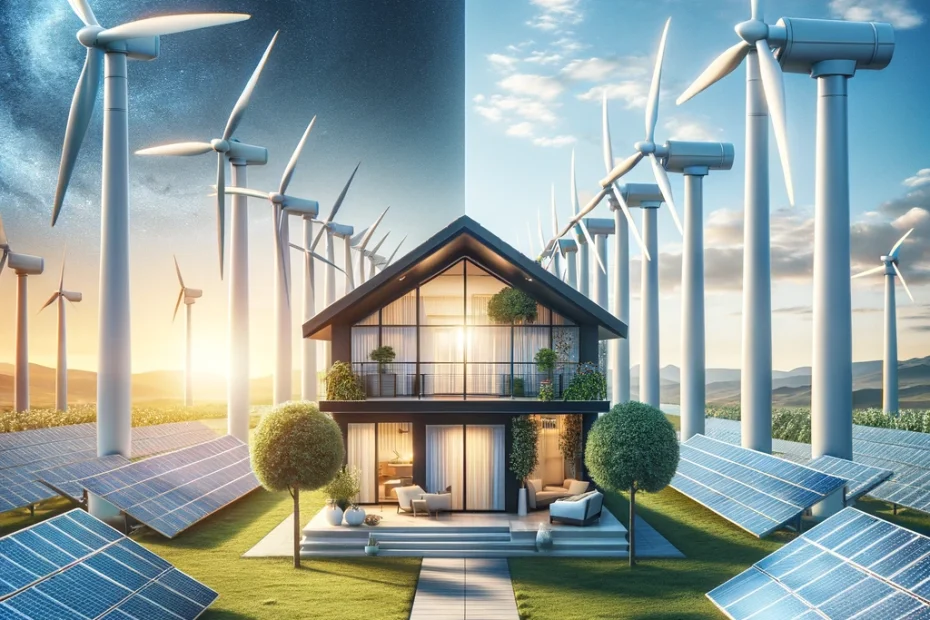Choosing the right renewable energy source for your home can be a daunting task, especially when it comes to wind energy vs. solar power. Both have their merits and demerits, but which one is truly best for your home? This comprehensive guide will delve deep into the nuances of both renewable energy sources, helping you make an informed decision.
Wind Energy for Your Home
Wind energy harnesses the power of wind to generate electricity. It’s a clean, renewable source that can significantly reduce your carbon footprint. But is it right for every homeowner?
How Wind Energy Works
Wind turbines convert the kinetic energy in wind into mechanical power. This mechanical power can then be converted into electricity through a generator, which can be used to power homes, businesses, and even charge batteries.
Pros of Wind Energy
- Renewable and Clean: Wind energy is abundant and generates electricity without emitting greenhouse gases.
- Cost-Effective Over Time: Initial installation costs can be high, but maintenance costs are relatively low, making it cost-effective in the long run.
- Efficiency: Wind turbines can generate electricity 24/7, provided there is wind.
Cons of Wind Energy
- Initial Cost and Space: The initial setup cost for a residential wind turbine can be steep, and you need enough space to install one.
- Dependent on Location: Wind energy is highly dependent on your location’s wind speed. Some areas might not be windy enough to justify the investment.
- Noise and Aesthetics: Wind turbines can be noisy and may not be visually appealing to everyone.
Solar Power for Your Home
Solar power uses the sun’s energy to generate electricity. It’s one of the most popular forms of renewable energy for residential use. But what makes it so appealing?
How Solar Power Works
Solar panels, or photovoltaic (PV) cells, convert sunlight into electricity. This electricity can then be used to power your home, store in batteries for later use, or even sell back to the grid in some areas.
Pros of Solar Power
- Abundant and Reliable: The sun provides a consistent and abundant energy source, making solar power a reliable energy solution.
- Decreases Electricity Bills: Solar panels can significantly reduce your monthly electricity bills, and you may even earn credits for excess power generated.
- Low Maintenance: Once installed, solar panels require minimal maintenance and can last for 25-30 years.
Cons of Solar Power
- Initial Investment: While costs have decreased, the initial investment for solar panels can still be high.
- Weather Dependent: Solar panels rely on sunlight, making them less effective on cloudy or rainy days.
- Space Requirements: You need a sufficiently large and properly oriented roof space to install solar panels.
Comparative Analysis: Wind Energy vs. Solar Power
When comparing wind energy and solar power for residential use, several factors come into play, including your location, energy needs, budget, and space availability.
Efficiency and Production
- Wind turbines can produce more electricity at a lower cost per kilowatt-hour (kWh) if you live in a windy area.
- Solar panels are more versatile and can be installed in most locations, providing a consistent energy output throughout the year.
Cost and Return on Investment (ROI)
- Solar power tends to have a faster ROI due to lower upfront costs and various incentives available.
- Wind energy might offer a better long-term yield in windy regions despite the higher initial investment.
Environmental Impact and Sustainability
Both wind energy and solar power are clean, renewable energy sources. Your choice might depend on which resource is more abundant in your area and the specific environmental impacts you wish to mitigate.
FAQs
Can I combine wind energy and solar power at home? Yes, combining both can offer a more stable and efficient energy supply, leveraging the strengths of each.
What are the key considerations for installing a wind turbine or solar panels? Consider your local climate, space availability, initial investment, and long-term savings.
How do government incentives affect my choice? Government incentives can significantly reduce the initial cost of renewable energy installations. Check local programs for solar and wind energy.
What’s more important, the initial cost or the long-term savings? While the initial cost is an important consideration, the long-term savings and environmental benefits often outweigh the upfront investment.
How do I know if my home is suitable for wind energy or solar power? Consult with renewable energy professionals to assess your home’s suitability based on location, wind speed, sun exposure, and other factors.
Conclusion
Choosing between wind energy and solar power for your home involves weighing the pros and cons of each. Consider your geographic location, energy needs, and financial capacity. Both options offer a pathway to reducing your carbon footprint and achieving energy independence. By carefully considering your options, you can select the best renewable energy source for your home, contributing to a greener, more sustainable future.
